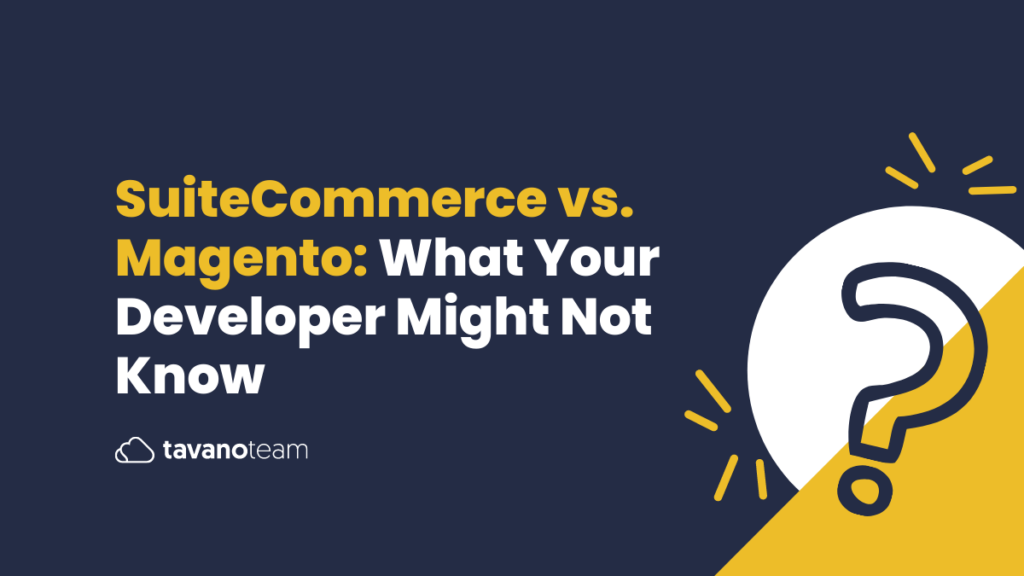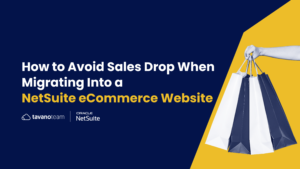SuiteCommerce vs. Magento? Business owners struggle when deciding if they should build their eCommerce presence in NetSuite or the very popular Magento, which is used for 12% of all online retail stores. I’ve wanted to write a non-biased article about this topic for some time. And the time has come!
This article aims to help companies that are already running NetSuite evaluate the pros and cons between NetSuite SuiteCommerce Advanced or Magento (a best-of-breed system).
As I’m writing this article, an online inquiry (from our website) just came through my inbox, and it reads:
“Hello, we currently run a Magento based eCommerce solution that ties into our NetSuite Production environment. We are considering implementing the NetSuite eCommerce Platform and wondering what are the front-end implementation costs involved.”
Wow, the timing couldn’t be better – you may think I’m making this up, but I’m not!
The truth is, we hear more and more often about companies running NetSuite ERP and Magento for eCommerce, and seriously considering switching to full SuiteCommerce websites. As for this new prospect that just arrived, whether they end up going with SuiteCommerce or not, it seems that they are experiencing pains with the Magento-NetSuite scenario. So I hope they can read this article before they make up their mind.
Understanding where the value it’s at
When coming across such a decision, it’s essential to take the time to evaluate all your options.
At the end of the day,
you want to make the best decision, NOT for
your webstore manager, eCommerce consultant, or developer
– you need to decide on
what’s best for the business.
One of the main points I want to address today is identifying the real value for the business that comes with each decision. You will need to evaluate each platform’s features and benefits, and the disadvantages (and the price that comes with these).
For example, you might love using XYZ software because it provides all these beautiful reporting tools and dashboards. However, if you need to allow 24 hours before reports and dashboards update the data, it will end up hurting you at the end of the day. Regardless of how lovely and intuitive XYZ software might be.
Understanding where the value is at is often missed by beautiful colored mirrors and misinformation of decision-makers.
To help you take a closer look at the potential scenarios your business will be facing here, we list six essential factors to consider when evaluating which path to take.
1. Scalability
Don’t be confused by associating scalability in terms of supporting website traffic growth only. Even though Magento and SuiteCommerce can help high-traffic websites and traffic peaks, that’s not all you need to look for.
We need to address scalability around supporting online business growth on the front end AND on the back end. Meaning: managing and supporting exponentially growing transactions, fulfillment, payment processing, inventory adjustments, and returns (RMAs). In short, all that nitty-gritty that comes with managing a real eCommerce website.
As order volume increases, there’s a greater risk of coming across new (or edge) scenarios that will challenge your order management, fulfillment returns, and many other processes you have in place.
Is your business better off with the best-breed systems scenario where each system needs a connector to integrate? Think, for example, Patchworks Magento – NetSuite connector, where you need to deal with the connectors’ issues while trying to deal with your increasing incoming orders. Or is it better to go with a unified platform scenario where there’s no need to integrate any 3rd party system, and your only focus should be on managing and processing orders?
Finally, you should analyze scalability around a business software’s flexibility to adjust as the business grows. Businesses change over time. And business owners suddenly discover they need to support things they didn’t before. Whether it’s supporting multiple languages or currencies, adding new departments, improving supply chain visibility, etc. The list is endless.
By the way, did you know Magento has a single global stock level — no matter how many domains/stores or warehouses — it only natively supports a single virtual stock location.
Software flexibility is crucial. Understanding the benefits of having one data source of truth can enable your business to react quickly to the market and make fast decisions based on accurate and real-time data.
2. Hosting
The first thing you need to ask yourself is: do I understand the benefits (and most importantly, the value for the business), or don’t have to worry about the day-to-day infrastructure management?
One big difference between Magento Enterprise Edition (or Community Edition) and SuiteCommerce is your website hosting. In both Magento editions, the customer needs to host the website. This involves extra time from your team to manage, support, and optimize your hosting, GitHub repositories, and everything around it for dev sites and production sites.
The beauty of SuiteCommerce is that it’s on the cloud. This means you don’t have to worry about your website hosting since it’s already provided and supported by NetSuite.
Back to my previous point, having to deal with hosting (and everything around it) adds more potential issues (and extra time from your team) to support growth.
Note: Magento released an enterprise cloud edition in April 2016, and this might work great, but we don’t have enough customer feedback to review it for this article.
3. SuiteCommerce vs. Magento: Payments
Magento counts with many payment methods available for their merchants. That’s great. However, there’s a flip side to the coin. How do you process all these payment methods? What about that transactional data getting transferred to your NetSuite ERP? Right, that’s where connectors come in again…
As you start accepting multiple payment methods such as Invoice (terms), ACH, credit cards, and Paypal, it gets complicated handling the security and details of passing all this payment information back and forth from NetSuite to Connector Magento.
In similar regards, we’ve heard about troubles with synching sales tax and promo codes.
4. Website Speed
Website performance is critical. A slow-loading web page can not only impact your shoppers’ experience but can seriously hurt your SEO.
Magento is known for having issues with speed and performance degrading over time. This doesn’t mean that you cannot have a super fast website in Magento. However, it’s essential to understand the efforts that it entails to get it run lightning-fast.
To optimize Magento websites — besides choosing a fast web hosting — you need to implement a CDN (Content Delivery Network). In addition, you can’t forget about caching, enabling flat categories/flat products, or enabling Magento compilation.
Also important: cleaning up the Magento database and logs, performing specific MySQL configurations, updating indexes, and installing PHP accelerators, among other optimization tricks you will need to pull.
On the other hand, SuiteCommerce Advanced will make it easier for the business as it comes with lightning-speed performance out of the box. It provides incredibly fast-loading pages with an advanced architecture, edge caching, and content delivery network. It’s quite amazing to observe SCA websites perform even quicker than top online retailers.
5. SuiteCommerce vs. Magento: Extensions
Magento is probably the shopping cart software with the most available extensions. Any product feature, name it, and boom, it’s available for you thanks to a Magento developer coding from a remote place in the world. There are so many extensions in the menu that I’ve read Magento customers complaining about how overwhelming it gets! Unbelievable, right? I guess there are people that they like to complain about.
There are three things to take into consideration, though.
The first one is that installing multiple extensions from multiple developers can generate code conflicts that can translate into big issues. At the same time, extensions have proven to create problems for merchants with Magento upgrades.
The second one, 3rd Party apps (or extensions), are often central to the website’s functioning and represent a potential pitfall — they are outside of Magento’s API. More often than not, apps functions are not available for your back office. If you open up a Magento website that’s been running for several years as an integrator, it’s often like Pandora’s Box. You don’t know what you might find!
The third one is more about assessing what you need for your eCommerce website. It’s great to have as many options as possible. Still, if you will plug a long list of extensions into your Magento website and run the risk of issues related to conflicts between them and upgrades, you should at least assess your business’s value of having these extensions in the first place.
To the point of this article, when considering any of these extensions as a must-have feature, understand if they are worth the complications and headaches of going through the points above. This takes us back to the introduction part – really identifying the value of the business.
6. SuiteCommerce vs. Magento: Cost
This is the most sensitive point of all, and that’s why I left it to the end.
Comparing apples to apples
When comparing SuiteCommerce Advanced versus Magento, you need to compare as follows:
SCA license price
vs.
Magento license price + Infrastructure (hosting + hosting support, maintenance, and optimization) + Magento-NetSuite connector license price
Licenses prices
Magento Community: Free to download and install, but if you want to have access to technical support, faster speed, more out-of-the-box functionality, Solr search, Scalability, and Cross-sell/up-sell/recommended products, you need to go Enterprise edition.
Magento Enterprise Edition: On the enterprise edition, it’s a revenue model where you pay based on your online revenue. The license cost begins at $22,000 annually.
SuiteCommerce Advanced: List price is $4,999 per month ($60K/yr)
As I mentioned at the beginning of this article, my intention is not to rule out a Magento-NetSuite integration scenario. Instead, add more elements that can help decision-makers which way to go.
You sure can make NetSuite-Magento integration work and have a powerful, custom-designed, pixel-perfect website. But be aware that there are risks involved. On the other hand, SuiteCommerce Advanced may not have as many out-of-the-box features as Magento, but can also deliver a powerful, custom-designed, pixel-perfect website with the benefit of having all running under the same unified system.
The question you need to ask yourself is: “What’s best for my business?”
If you have any more doubts about SuiteCommerce, here are 6 reasons why it could be the perfect platform for your business, or you can contact one of our SuiteCommerce Developers to guide you through your doubts!




